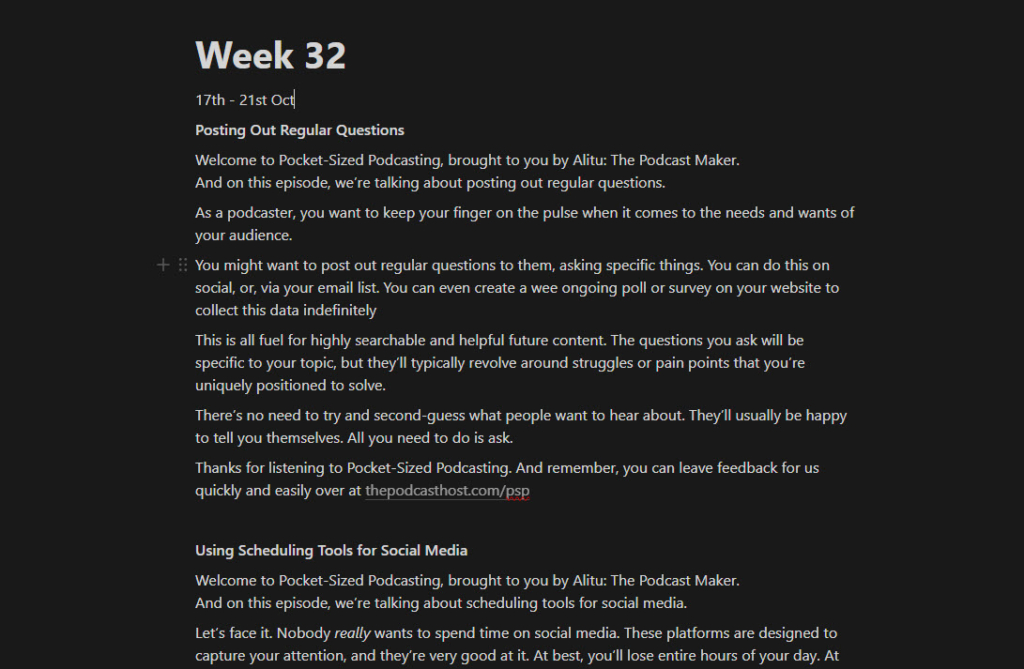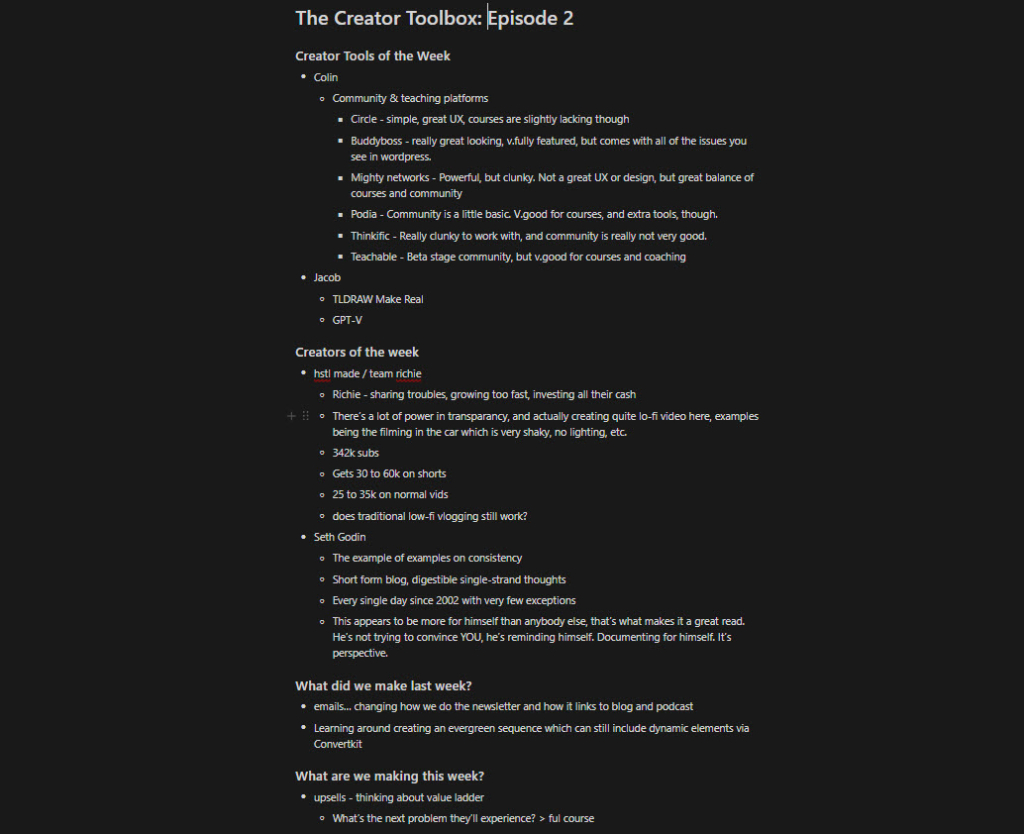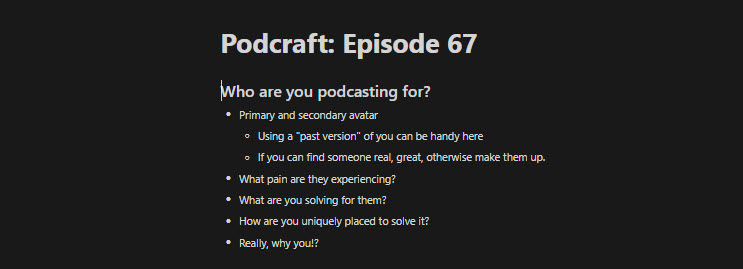Creating a Great Podcast Script: 3 Methods Top Podcasters Use

Podcast scripting is a really personal thing. I know successful hosts that script their whole show, word for word. And I know other hosts that write down the show title and nothing else, ad-libbing from there. Neither way is right or wrong and, in the real world, most people go for something in-between.
There’s a spectrum, from `fully-scripted` to `not-even-slightly-scripted`. So it’s impossible to tell you exactly how to do it. But, I can tell you a few ways that we’ve done it on our team, and which cover a whole lot of the top pods too. You can try those ways, play around with them, tailor them for your needs. And, with a bit of time, you’ll find the type of scripting that suits you.
So, before you press the big red button and start recording your podcast, here are the levels of scripting. Time to figure out which one’s for you!
Option 1: The Word-for-Word Podcast Script
✔️ You’ll never miss a detail
✔️ Can build confidence
✔️ You can sculpt really great content
❌ It takes a long time to prepare
❌ Reading a script can sound monotone
A common starting point for fledgling podcasters is word-for-word scripting. That means you create a traditional, fully-fledged, word-by-word script which you then read out in full.
This can be a good way to ensure that you cover everything you need. Reading right through, you’ll make sure you don’t miss anything out and you’ll get all the facts right.
It’s also good for people who are a bit less confident in speaking and who’d rather be methodical about recording. Or for more complicated subjects – maybe something you’re not quite so au fait with – it can be really useful. It’s obviously quite difficult to speak on the fly when you have to remember a lot of facts with which you’re not totally familiar.
The disadvantage of this approach, though, is that it can often lead to a pretty stilted, monotone delivery as you read right off the page. You tend to forget to inject your own tone or personality into that information.
That’s not always the case, though: some people can read a script and manage to make it sound really natural. There’s also a skill to writing more like you speak, so when you write your script, you put it together in a speaking tone. When you come to read it, word-for-word, it’ll still sound conversational.
Example from Pocket Sized Podcasting

This is a 1 to 2 minute daily show, so it needs to be on-point. No tangents, the content needs to give a huge amount of value in a short space of time. That means a word-for-word script!
Option 2: Writing a Detailed Podcast Episode Outline
✔️ Good middle ground of detail and flexibility
✔️ Allows you to stay on-track, but sound conversational
❌ Can lead to distraction as you try to read AND ad-lib
The alternative, of course, is to write up an episode outline rather than a script. To me, this is a 2-stage process.
First, you write out bullet points for the top-level topics you want to cover. This might be 5 to 10 bullets. If you’re nearing 10 or above, you might be trying to cover too much!
Next, you start to flesh out each of those bullets with 4 to 7 bullets of their own, with a decent little bit of detail in there. These can be sentences, but not more than 1 per bullet. Try to keep them brief. The longer you go with each point, the more you veer towards reading. That takes you away from the goal here, which is to hit that balance between conversational and flexible, but still well planned.
This is a good compromise between writing a full script and doing it on the fly. You’ll have the detail there, but you still have the flexibility to be conversational, adding a bit more personality.
Example from The Creator Toolbox

You’ll see this script includes titles for the sections of the show, then bullets for each of the main topics, and sub-bullets for a bit of detail. This keeps me on-track, but I can still ad-lib around it all.
Option 3: A Flexible, Rough Bullet Point Podcast Plan
✔️ Very quick to plan
✔️ The least distracting, and the most flexible
❌ Can lead to tangents or fluffy content
❌ Can lead to missing out valuable points
❌ Takes confidence and skill to do really well
This is near the make-it-up-as-you-go-along end of the spectrum, and takes the form of a short set of section headers.
These headers represent themes or topics within the episode, and are mostly just reminders of where you’re going on the show. In this case, you rely on your expert knowledge on the subject to fill in the gaps.
This leads to the most conversational type of podcast and is often the most engaging. When you’re speaking from experience, ad-libbing much of it, your voice becomes a lot more active, a lot less monotone. The problem, of course, is that there’s a significant chance that you’ll miss things out or perhaps get something wrong. It’s also much more likely you’ll go a bit off-track, talking on a tangent and wasting a bit of time.
Example from Podcraft

I know this topic inside out, so I don’t need much guidance. I’ve also talked about it so many times that I know I can do it pretty succinctly, without too many tangents (one of the dangers of having a really loose, rough script!).
Choose Your Podcast Scripting Approach
Whatever method you choose is perfectly fine. As I said, it’s a really personal choice and you’ll find one you prefer with a little experimentation. It’s pretty likely that you’ll start out by writing full-on scripts, reading them word-for-word in recording. Then, as you get more confident, you’ll most likely move onto slightly less structured material.
Even once you’re fully confident, it can still be a good idea to have scripts for the set-piece moments. They’re the sections you really need to get right and cover specific material, such as the episode intro, or maybe a sponsor message.
Try This
Whether you’re new to the game or an experienced podcaster, try writing a script for a one-minute segment on your show. Write it word for word, and try reading out each sentence as you’re writing it. This will give you an idea of how readable and how conversational it is. As I say, it’s a skill to both write in a readable way, and to read a script in a natural manner.
Keep refining this section until you can read it in a really natural way. Once you can do that, you’re ready to write invisibly scripted segments or links that’ll add a huge amount of professionalism to your show.
And then? Time to record! Check out these followups if you’re still looking:
👉 How to Record a Podcast
👉 Best Call & Solo Recording Tools for Podcasters
Scripting Your Podcast – Next Steps
Podcast scripting is just one of the many things we help people with in our weekly live Q&A sessions.
Join the The Podcraft Academy if you’d like help, support, guidance, or advice on any aspect of podcasting.
The live Q&A sessions are just one aspect of the Academy, too. In there you’ll find all of our video courses, downloadable resources, checklists, templates, and more!
